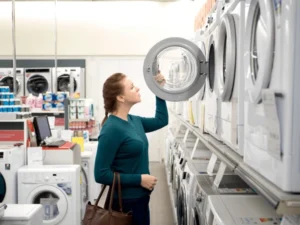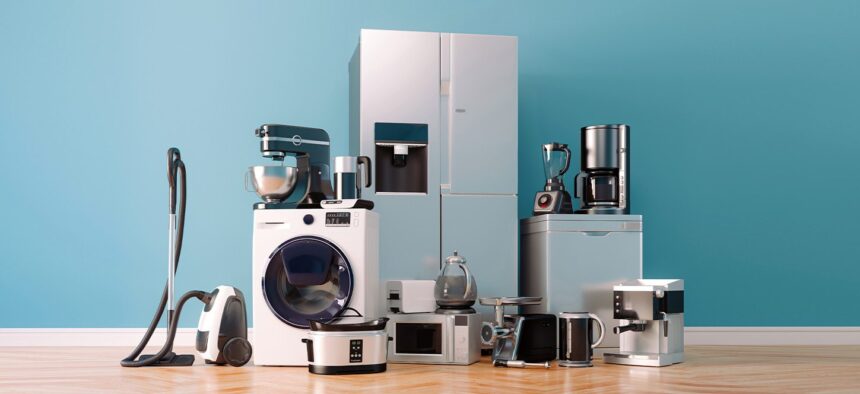White goods are the backbone of every household, making life easier with their essential functions. Whether it’s keeping your food fresh or your clothes clean, goods like refrigerators, washing machines, and dishwashers are indispensable in our daily routines.
In this blog post, we’ll dive deep into the world of white goods, exploring what they are, why they matter, and how to choose the best ones for your home. Let’s get started!
What Are White Goods? Understanding the Basics
White goods are large household appliances that are essential in every home. These include items like refrigerators, washing machines, ovens, and dishwashers. These appliances are called goods because they were traditionally white, but today, you can find them in a variety of colors and finishes. They play a crucial role in making our lives easier by helping with daily tasks such as keeping food fresh, cleaning clothes, and cooking meals.
Each type of white goods has a specific function that is vital to running a household. For example, refrigerators keep food fresh for longer, while washing machines make it easy to clean clothes without much effort. Understanding what each appliance does and how it can benefit your daily life is important when deciding which goods to purchase.
When choosing goods, it’s also important to consider the space in your home and your lifestyle needs. For instance, a large family might need a bigger refrigerator or a high-capacity washing machine, while a smaller household might not need such large appliances. Additionally, many modern white goods are designed to be energy-efficient, which can help reduce electricity bills and benefit the environment.
Why White Goods Are Essential for Every Home
White goods are more than just appliances; they are essential tools that make our lives easier and more comfortable. Without them, many daily tasks would be much more difficult and time-consuming. For example, washing clothes by hand can take hours, but a washing machine can do the job in a fraction of the time.
In the kitchen, goods like ovens, refrigerators, and dishwashers are indispensable. They help with cooking, storing food, and cleaning up afterward. These appliances save time and effort, allowing you to focus on other important things in your life. For many people, life without goods would be unimaginable because they make everyday tasks so much simpler.
Besides their convenience, goods also contribute to the overall functionality of a home. A well-equipped kitchen or laundry room can make a big difference in how efficiently a household runs. When your appliances work well, everything else seems to fall into place. This is why investing in quality white goods is essential for every home.
Top 5 Must-Have White Goods for Your Kitchen
The kitchen is often the heart of the home, and having the right goods can make it even better. Here are the top five must-have white goods that every kitchen should have:
- Refrigerator: A refrigerator is a must for keeping your food fresh and your drinks cold. It’s one of the most important white goods in any kitchen.
- Oven: Whether you’re baking, roasting, or just heating up leftovers, an oven is essential for cooking a variety of meals.
- Dishwasher: A dishwasher saves time and water by efficiently cleaning your dishes, making it a key appliance in modern kitchens.
- Microwave: For quick meals and reheating food, a microwave is incredibly convenient and useful.
- Freezer: If you like to store frozen foods or batch-cook meals, a freezer is a great addition to your kitchen white goods.
Each of these white goods plays a vital role in making your kitchen more functional and efficient. Having them in your home can greatly improve your cooking and cleaning experience.
How to Choose the Right White Goods for Your Home

Choosing the right white goods for your home can seem overwhelming, but with a little planning, it becomes much easier. First, think about the size of your household and your daily needs. A large family might need bigger appliances, while a smaller household could get by with more compact options.
Next, consider the space you have available. Measure the areas where you plan to put each appliance to make sure they will fit. You don’t want to buy a refrigerator only to find out it’s too big for your kitchen. Also, think about how often you use each appliance. If you cook often, investing in a high-quality oven or stove might be worth it.
Energy efficiency is another important factor. Modern goods often come with energy ratings, which can help you save money on electricity bills. Look for appliances with high energy efficiency ratings to get the best value over time. Lastly, consider your budget, but remember that sometimes paying a little more upfront for a better-quality appliance can save you money in the long run.
Energy Efficiency in White Goods: Save Money and the Environment
Energy efficiency is a key consideration when buying white goods. These days, most appliances come with energy ratings that show how much electricity they use. Choosing energy-efficient goods can help you save money on your electricity bills and reduce your impact on the environment.
One way to ensure you’re getting an energy-efficient appliance is to look for the Energy Star label. This label means the appliance meets strict energy efficiency guidelines set by the government. Energy-efficient goods use less power to do the same job, which means they cost less to run over time.
Another thing to consider is the size of the appliance. Larger appliances typically use more energy, so only buy what you need. For example, a smaller refrigerator or washing machine might be more energy-efficient if you have a small household. Additionally, using your goods wisely—like running the dishwasher only when it’s full—can further reduce energy consumption.
The Lifespan of White Goods: How Long Should They Last
The lifespan of white goods varies depending on the type of appliance and how well it’s maintained. On average, most goods last between 10 to 15 years. For example, refrigerators and washing machines typically last around 13 years, while ovens and dishwashers may last about 10 years.
Regular maintenance can extend the life of your goods. Cleaning them regularly, checking for any issues, and following the manufacturer’s guidelines can help prevent breakdowns. It’s also important to replace any worn-out parts to keep your appliances running smoothly.
If your goods are nearing the end of their lifespan, it might be time to start thinking about replacements. Newer models are often more energy-efficient and come with better features. By planning ahead, you can avoid the inconvenience of a sudden appliance breakdown.
Tips for Maintaining Your White Goods for Longevity
Maintaining your white goods is essential for keeping them in good working condition and extending their lifespan. Here are some simple tips to help you take care of your appliances:
- Clean Regularly: Regular cleaning prevents dirt and grime from building up and causing problems. Make sure to clean both the interior and exterior of your appliances.
- Check for Leaks: For appliances like washing machines and dishwashers, check for leaks and fix them promptly to avoid water damage.
- Follow the Manufacturer’s Instructions: Always follow the care and usage instructions provided by the manufacturer. This includes using the right detergent and not overloading your appliances.
- Replace Worn-Out Parts: If you notice any parts that are worn out or not working properly, replace them as soon as possible to prevent further damage.
Best Brands for White Goods: What You Need to Know
When it comes to white goods, choosing a reliable brand is just as important as selecting the right appliance. Some brands are known for their durability, energy efficiency, and customer service. Brands like Samsung, LG, and Bosch are often recommended for their high-quality goods.
- Samsung: Known for its innovative technology, Samsung offers a range of white goods that are both stylish and functional.
- LG: LG is another top brand, praised for its energy-efficient appliances and smart features.
- Bosch: Bosch is a reliable brand that focuses on quality and longevity, making it a great choice for white goods.
When selecting a brand, consider factors like warranty, customer reviews, and the availability of spare parts. A good brand will not only offer quality products but also excellent customer support.
Smart White Goods: The Future of Home Appliances

Smart white goods are the latest innovation in home appliances, offering convenience and efficiency like never before. These appliances are connected to the internet, allowing you to control them remotely via your smartphone or tablet.
With smart goods, you can do things like start your washing machine while you’re at work or preheat your oven before you get home. Some models even have features like voice control and integration with other smart home devices, making them incredibly user-friendly.
Another benefit of smart goods is their ability to monitor their own performance. For example, a smart refrigerator can alert you if the door is left open, or a smart washing machine can notify you when it’s time to clean the filter. These features not only make life easier but also help extend the lifespan of your appliances.
How to Dispose of Old White Goods Responsibly
When it’s time to replace your old white goods, it’s important to dispose of them responsibly. Many appliances contain materials that can be harmful to the environment if not handled properly. Here’s how you can do it:
- Recycling: Many white goods can be recycled. Check if there’s a local recycling program that accepts old appliances.
- Donation: If your appliance is still in working condition, consider donating it to a charity or someone in need.
- Manufacturer Take-Back Programs: Some manufacturers offer take-back programs where they will collect and recycle your old appliance when you buy a new one.
Proper disposal of white goods ensures that valuable materials are recycled and harmful substances don’t end up in landfills. It’s a simple way to do your part for the environment while upgrading your home.
Conclusion
White goods are important parts of our homes, making everyday tasks easier and faster. From keeping our food fresh to helping with laundry, these appliances play a big role in our daily lives. Choosing the right goods and taking care of them properly can make your home more comfortable and save you money in the long run.
As technology improves, goods are becoming smarter and more energy-efficient, making them even more helpful. By understanding what you need and picking the right appliances, you can make your home more efficient and enjoy the benefits of modern white goods.
FAQs
Q: What are white goods?
A: White goods are large household appliances like refrigerators, washing machines, and ovens that help with everyday tasks at home.
Q: How long do white goods usually last?
A: Most white goods last between 10 to 15 years, depending on the appliance and how well it’s maintained.
Q: What should I consider when buying white goods?
A: Think about the size of your household, the space available, energy efficiency, and your budget when choosing white goods.
Q: Are smart white goods worth it?
A: Yes, smart white goods offer convenience with features like remote control and energy monitoring, making them a great choice for modern homes.
Q: How can I dispose of old white goods?
A: You can recycle them, donate them if they still work, or use manufacturer take-back programs to dispose of old white goods responsibly.






